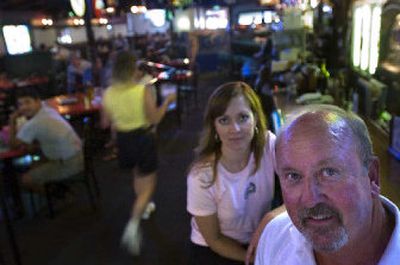Smoke ban crackdown begins

Smokers can light up with impunity on the patio at the Swinging Doors tavern in Spokane, even if they’re closer to the business entrances than a recently enacted state law allows.
Owner Bob Materne this week was granted the region’s first – and, so far, only – variance to the Clean Indoor Air Act that took effect in December. Materne said he spent more than $4,000 on airflow equipment to be able to allow cigarettes in the outdoor area less than 25 feet from the building’s doors. He had to prove to Spokane Regional Health District officials that not a whiff of smoke would enter the Francis Avenue establishment.
“It means we’re legal,” said Materne.
Maggie Merrill, a district health educator, said Materne’s property passed intense scrutiny, including a test involving three smoke bombs, before the variance was granted.
“We checked and double-checked,” said Merrill, part of a three-person tobacco enforcement team.
But area business owners who don’t take the same pains as Materne won’t find the health district so accommodating. After fielding more than 100 citizen complaints about smoking violations in the past seven months, officials have hired outside inspectors to help handle the load.
“The goal is to respond to complaints and do random spot-checks,” Merrill said. “It’s important to enforce the law. Overall, the community has embraced it.”
Starting this week, health district officials have contracted with State Protection Services of Spokane Valley to tackle a backlog of 44 active complaints. The firm, operated by Washington State Patrol Detective Major Bambino, will earn $15,000 between now and June to provide eight hours of inspection services a week, according to a district contract.
The new inspectors could help offset a perception by Materne and others that tobacco regulations aren’t being uniformly enforced.
“I’ve been to numerous places where I won’t say there’s smoking in the building, but on patios and decks,” said Materne, who wouldn’t name the spots. “When I’m the only one that applied for a variance, what does that tell you? Most of them aren’t caring.”
“If (smoking) is in fact going on, it will be caught,” Merrill said.
Citizens have called in 114 complaints to the health district’s tobacco violation line since the new law was enacted in December, records showed. More than half targeted perceived violations at bars, taverns and restaurants, especially in the early months of the new regulations.
Recently, however, the complaints have changed, particularly following last week’s stern denouncement of secondhand smoke by the U.S. surgeon general. Richard Carmona declared there is no safe level of secondhand smoke and that even a few minutes spent inhaling the fumes can harm non-smokers. He called for completely smoke-free buildings and public places.
That announcement intensified a recent local trend toward complaints focusing on businesses, offices, even a convent. Nearly one-third of registered complaints target those establishments, records showed.
In May, for instance, someone complained that the owners of the Farmers Market and Garden Center in Spokane were “chain smoking as they help customers.” No inspector has been sent yet to the site, records showed.
But the owners of the 60-year-old family nursery and produce business disputed the claim.
“Me and my brother don’t smoke,” said Rick Naccarato, 39, who runs the business with his brother, Mike Naccarato, 40. “I really don’t know what that’s about.”
Inspectors are welcome to check out the May 26 telephone call, said Naccarato, who admits he does use chewing tobacco, which is not covered by the new law.
“It was probably somebody who wanted to bring back a dead tree from two years ago,” he said.
The need to witness and document smoking violations makes ensuring compliance a tricky, time-consuming process, said Merrill.
Injunctions and judgments have been lodged against four area businesses in connection with the new law, Spokane County Superior Court records showed.
A judge last week signed a second injunction against a business owned by Gregg Phillips of Spokane. Superior Court Judge Jerome Leveque granted a default in favor of the health district against Mr. G’s Bar and Grill in Spokane Valley. Inspectors found the bar in violation three times between December and April, records showed.
In April, Leveque also granted an injunction against the Yardley Bar and Grill in Spokane Valley, also owned by Phillips.
Phillips’ lawyer, David M. Miller, said Thursday that his client continues to believe that the new law is unconstitutional.
“It’s not an equal law. Smokers and non-smokers are not a protected class,” said Miller. Phillips has not indicated whether he plans to formally contest the law, Miller said.
Leveque also levied judgments against two other bars that settled injunctions before trial, but then failed to comply with required terms. The Lone Cactus Saloon and Restaurant in Spokane and G. Litzee’s Tavern in Greenacres must pay about $1,200 each in fees and fines.
But Gary Litzenberger, owner of G. Litzee’s, said he couldn’t pay the fines because the smoking law cost him customers and forced his income to plummet.
“I can’t pay you if I don’t have it,” said Litzenberger, who added that he is selling the business.
Overall, reaction to the new law has been positive, health officials said. That’s evident in small signs, such as the applause that erupts at an event like Hoopfest when it’s declared to be a smoke-free gathering.
“The social norm is starting to shift,” said Merrill. “People are starting to expect public events and places to be smoke-free – and they’re liking it.”